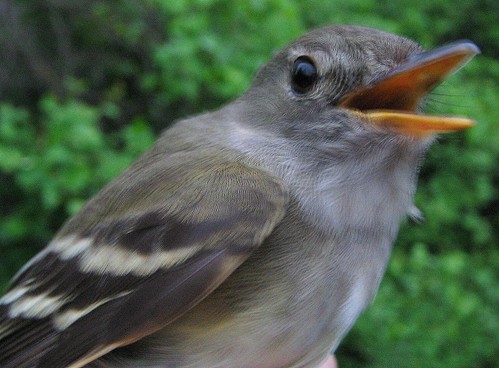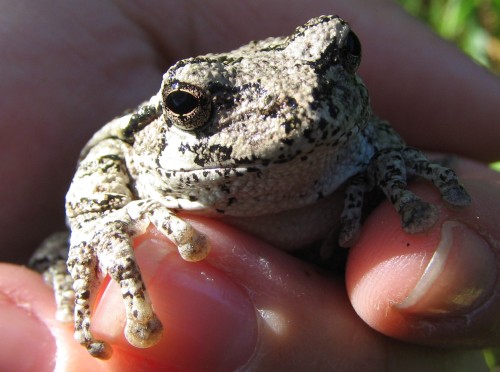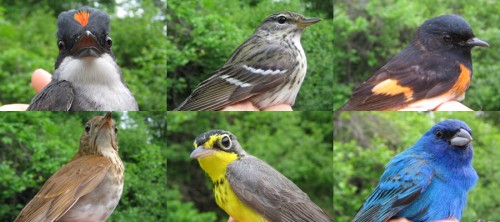Banders-in-charge:
Marcel Gahbauer, Marie-Anne Hudson, Barbara Frei
Assistants: Pierre Bannon, Jean Beaudreault, Martin Bowman,
Manon Dubé, Gerard Frechette, Emily Gray, Gay Gruner, Gillian Kinsman,
Betsy Macfarlane, Carine Lecoeur, Barbara MacDuff,
Francine Marcoux, Mike
Mayerhofer, Alexander McNeil, Lynn Miller, Chris Murphy, Julie Pépin,
Crissy Ranellucci,
Katleen Robert,
Kate Robinson
Notes:
This week was one of those weeks where
you wait and wait for that big push of migrants ... and nothing much
happens. With winds coming from the south on 3 of the 7 days, we
thought we'd be inundated with warblers and thrushes and vireos (oh
my!). However this push never really materialized, leaving only a
trickle of migrants. Later in the week the humidity went through the
roof, quickly allowing the mosquitoes to enjoy the feast we laid out for
them on a daily basis. Though we discourage the use of bug repellant
for those handling birds, we suggest that a quick spray to the back of
the collar and the back of the hat before leaving the house (and then
washing your hands), can provide a bit of relief. These areas aren't
generally touched too much over the course of the day, allowing you to
go relatively bug-free without smearing birds with bug-repellant. It's
a win-win situation!
Despite the apparent trickle of birds, the DET never slipped below 55
species, with a high of 70 on Wednesday and a cumulative weekly total of
99 species. New arrivals to MBO this week (11 species) were Pied-billed
Grebe (though it seems to have disappeared again), a visiting
Green-winged Teal, a pair of Gadwall, a fly-by Common Merganser, a flock
of Semipalmated Plovers, an almost-caught Black-billed Cuckoo, Eastern
Wood-pewee, Alder and Willow Flycatchers, Blackpoll Warbler, and Canada
Warbler. Of particular note for being new additions to the
all-time MBO list were the Gadwall (long overdue) and the Semipalmated
Plovers (a great surprise).

A highlight for this week was our fourth
foreign recapture: a Traill's Flycatcher that was
banded June 5, 2003 in Michigan landed in our nets early Saturday
morning. The gray
sky only allowed a rather marginal photo to be taken of our special
visitor.
(Photo by Marie-Anne Hudson)
Species diversity
wasn't too bad on the banding side as well, though last Sunday's record
(37 individuals, 18 species) is still quite safe for now with 8-13
species banded every day. Overall we banded 128 individuals representing
31 species, with newly-banded species (10 species) including
Yellow-bellied Sapsucker, Eastern Kingbird, Veery, Gray-cheeked Thrush,
Red-eyed Vireo, Chestnut-sided Warbler, Blackpoll Warbler, American
Redstart, Canada Warbler, and Indigo Bunting.
As always, we're eager to see what will hit the nets this coming week --
our last week of the season! At this point nothing will surprise us:
Barbara and Crissy walked up to the D nets only to find a female Mallard
sitting in the bottom pocket, dragging the whole net down to the
ground. A quick opening of the net was all she needed to fly out.
This week's top 10 [last week's rank in
brackets]
|
# individuals banded |
mean # individuals
observed daily |
|
Red-winged Blackbird (21)
[1] |
Ring-billed Gull (43)
[3] |
|
Yellow Warbler (13)
[9] |
Red-winged Blackbird (38)
[1] |
|
Common Yellowthroat (13)
[3] |
Canada Goose (32)
[-] |
|
Wilson's Warbler (11)
[-] |
Mallard (26)
[4] |
|
Magnolia Warbler (11)
[4] |
American Crow (23)
[2] |
|
American Goldfinch (9)
[-] |
American Goldfinch (22)
[5] |
|
Cedar Waxwing (8)
[-] |
Yellow Warbler (21)
[6] |
|
Northern Waterthrush (4)
[-] |
Cedar Waxwing (15)
[-] |
|
Common Grackle (4)
[6] |
Tree Swallow (13)
[8] |
|
Rose-breasted Grosbeak (3)
[-] |
Song Sparrow (11)
[10] |
|
The Red-winged Blackbirds
held onto their top spot (for a sixth straight week!) with 21 birds
banded, and Yellow Warblers rocketed to second place with 13. It's
amazing to us that we have been banding for 6 weeks and we're still
banding new Red-winged Blackbirds,Yellow Warblers and Common
Yellowthroats. Seems like there's no end in sight! Another interesting
addition to the weekly totals is the number of Wilson's Warblers banded,
pushing them to fourth place. The number of individuals observed daily
has remained relatively stable save for the addition of Cedar Waxwings
and a resurgence of Canada Geese, thanks to modest flocks flying past on
a couple of mornings. With any luck the growing flocks of waxwings will
hang around long enough for us to band most of them!
As always, we would like to extend a hearty thank you to all those
mosquito-braving individuals who helped with census, net runs and
banding - we couldn't do it without you!
|

On a non-birdy
note, this week the Gray Treefrogs have really been singing,
competing for air-time with the Yellow Warblers, Baltimore
Orioles and Song Sparrows. This little guy was found sitting
quietly in the shade under a Northern Cardinal nest.
(Photo by Marie-Anne Hudson)
|




